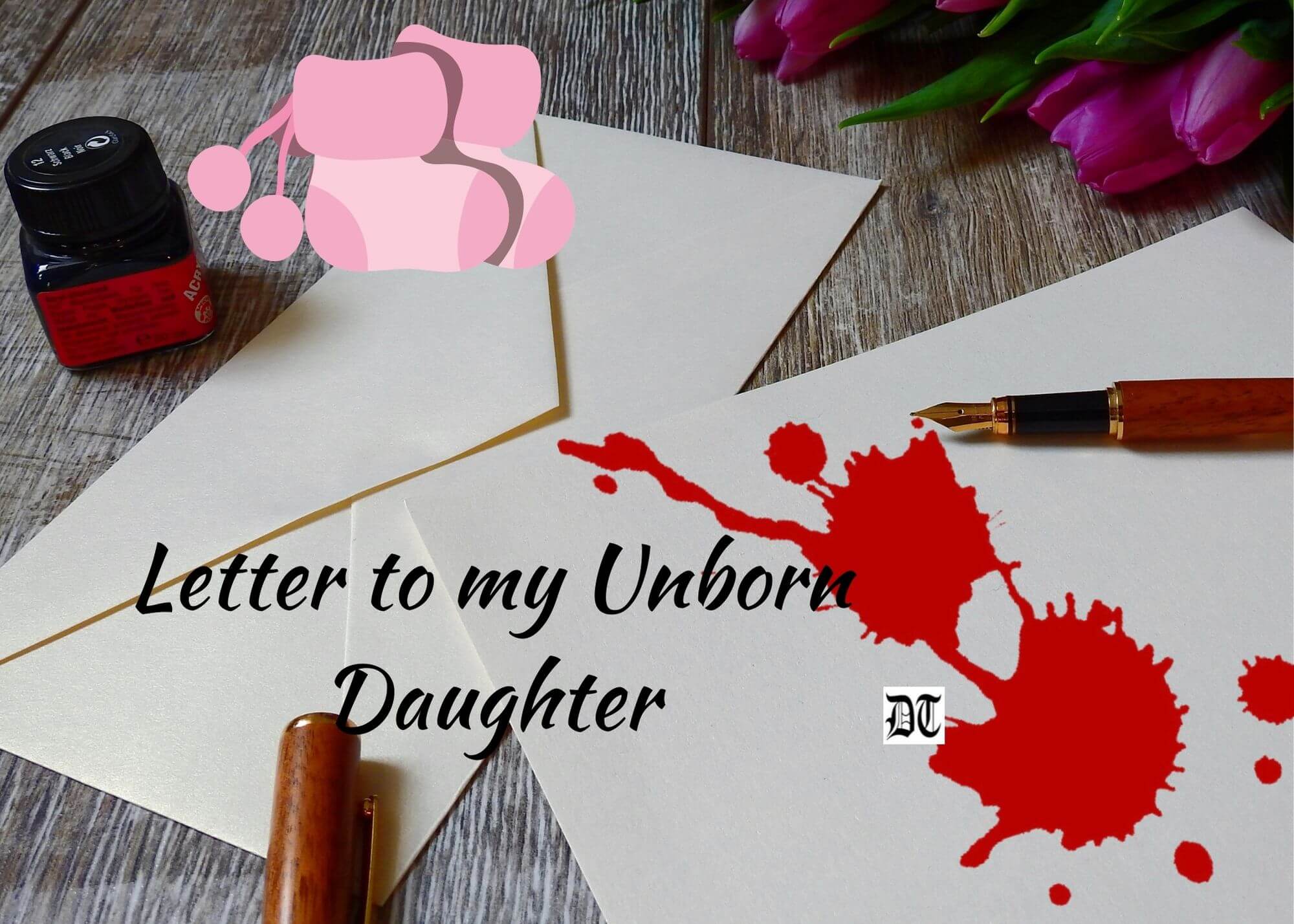In a confessional poem, Prof. Nandini writes a heart-wrenching letter to an unborn daughter, who was lost due to domestic violence. An exclusive for Different Truths.
Tiny limbs smeared with my fresh enflamed blood oozing out of the womb, gushing in fact. I knew. I had lost you. Then and there. Shattered. The sadomasochist burped, then casually farted, and snored in a short while, when the maid rushed us to the local hospital. I heard what you never uttered. Ahh heal ‘us’, protect ‘us’, you and me, me and you, Mom and her little girl wish to take the world in their stride. Today, a letter to you, my unborn daughter, after long two decades of quiet travail telling our tales to your younger brother, with a bleeding heart, I smile with exuding tears. Smile to see my dream daughter alive in her brother little; so full of love and compassion, so much a feminist-humanist male, so strong to hold Mom’s head high, so much you, so as I would have you. Ah! There was such rage over a female foetus growing up to be a girl of power and conviction, like Mom dear. Or like the Pancha Mahakanya. And the marital rapes, the threats to snatch you any given day, if I dissent, and then the termination. If at all there is a next birth for you, my little fairy, come back come back to my womb, life minus you is such dreary. You need not play the games that the heart must play. Pronounce before birth, you are not gonna be the woman of clay. Like Ahilya, never fall prey to Indra’s trickery; and if ever you do, do it by your choice, not anyone else’s, neither Goutam’s nor Indra’s. Your penance need not be broken by Lord Rama, the one who refereed his wife; you need not regain your human form by brushing his feet. Remain that dry stream, that stone, till you find a way to my womb again, in another life, another Yug; you need not be condoned of your guilt, you never were ‘guilty’. Let Indra be cursed, castrated, concealed by a thousand vulvae that eventually turns into a thousand eyes. Or like Draupadi, take your birth from a fire-sacrifice, be an incarnation of the fierce goddess Kali or the goddess of wealth, Lakshmi; but never be the sacrificial goat to accept five husbands just because someone else deliberated. If any Yudhishtir drops you at the Himalayas because you loved Arjun more, look in his eyes and declare, loud and clear-- it’s your right to live, love and pray. While never deriding the Duryodhana and Karn of your destiny, live laudable my dear. Nor Kunti be your role model; but if ever you propitiate the sage Durvasa, who grants you a mantra to summon a god and have a child by him, then take his charge. Don’t you recklessly test the boons life grants you by haze nor invite the Sun-God, Surya, give birth to Karna, and abandon. An unborn child is better than the one dejected, forlorn. Or if ever you are Tara, the apsara, the celestial nymph, who rises from the churning of the milky ocean be the Tara, Sugriva’s queen, and chief diplomat, the politically correct one, the woman in control of herself and folks around. In the folk Ramayans, Tara casts a curse on Rama by the supremacy of her chastity, while in some versions, Rama enlightens Tara. Be her, the absolute. Or be Mandodari, the beautiful, pious, and righteous. Ravana’s dutiful wife who couldn’t be his guiding force, Bibhishana’s compliant wife, the indomitable grace. Be you, the elemental, candid, real woman who is my ideal. Don’t ever let another female foetus be the victim of sadomasochism, unlike your fragile, fledgling Mom. Be all that she could never be, be her role model. I send you my prayers, the prayer before birth. Moon, rain, oceans, and the blue firmament, shining stars and a sun aglow are all that I have-- you must call them your own, my unborn daughter. Forgive me my love, for you died with all the petals falling from my autumn breast, the breast that you never suckled; you rain on my being and burn my heart, but calm my soul like simmering snow slowly concealed yet revealed. You will stay indomitable, taking new lives every single day in Mom’s prayers, poetry, social responsibilities, ecofeminism, messages, voices, layers of thoughts and action. My girl, I am what I decided to be after losing you, that’s the euphemism. I am not just a woman since that fateful night, but entire womankind. Now I am a woman of full circle, within me there is the power to create, nurture and transform. I rediscover pieces of myself through your unborn narrative, in the resonance in my quirky confluence.
Author’s Note: This Epistolary Poem was written in memory of my unborn daughter after twenty years of her death in my womb. The memory of my daughter, who I lost to domestic violence, made me upsurge as the phoenix. The flickering womb-to-tomb journey of my dear daughter was my resurrection; it made me the woman that I am today. In the poem, I beseech my unborn daughter to come back to me with the unsurpassed makings of the Panch Mahakanyas. I use myth as metaphor while I soar from my micro world to the macrocosm.
Picture design by Anumita Roy, Different Truths





 By
By
 By
By
 By
By
 By
By